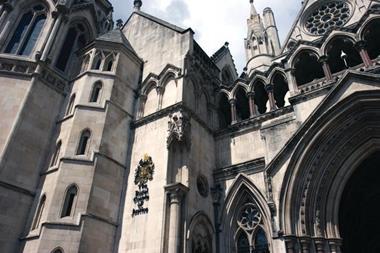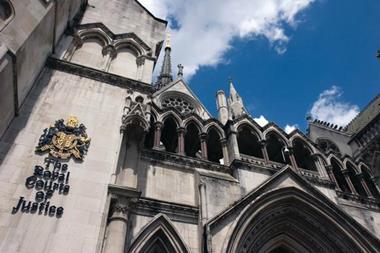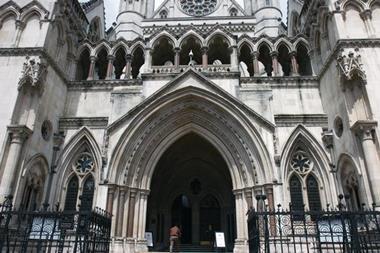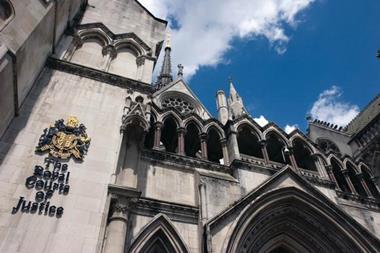For the first time organisations can be found guilty of corporate manslaughter
Marsh has warned UK businesses of the hidden risk and insurance implications of the Corporate Manslaughter and Corporate Homicide Act 2007, which comes into force on 6 April.
For the first time, organisations can be found guilty of corporate manslaughter arising from a gross breach of the general duty of care owed by senior management should they be involved in the failure of their organisation’s health and safety systems.
The Sentencing Advisory Panel, an independent body which advises the Court of Appeal on sentencing, recently issued a consultation paper on the proposed guidelines on sentencing for organisations convicted under the Corporate Manslaughter and Homicide Act. The consultation paper sets out the proposed starting point for the Court when considering an appropriate penalty for convicted organisations.
Based on the legislation and the Sentencing Advisory Panel’s recommendations, Marsh is advising firms that:
• The Act affects organisations operating in the UK, not just large corporates.
• Organisations can be found guilty if a gross breach of duty is proved and that this breach is due to substantial failings in the way the activities are managed or organised by senior management. This is likely to extend to employees driving vehicles as part of their employment. Organisations should look again at occupational road risk for all employees who drive as part of their employment.
• There are no limits on the potential fines for convicted organisations. Organisations will have to satisfy the courts that there are mitigating factors in order to seek to reduce or limit the level of any fine imposed.
• In addition to fines, organisations may be asked to take out publicity orders, which could result in advertising, statements in their annual reports or letters to suppliers and customers regarding their conduct and any penalties levied.
• The Act focuses on organisations - guilt will be attached to the organisation and not individual directors. Therefore, the insurances that organisations should be reviewing to check their existing criminal defence cover are their employers’ liability, public/product liability and motor cover, and not necessarily their directors’ and officers’ policies.
• With the exception of the level of potential penalties, the fundamental requirements to manage heath and safety under the Health and Safety Executive’s ‘HSG 65’ framework for managing health and safety have not changed.
• The new British Standard for Health and Safety – BS OHS 18001 – can help guide organisations on good health and safety practice.
Marc Spurling, a business risk consultant in Marsh’s Risk Consulting Practice, said: “The government expects that cases of corporate manslaughter or homicide following a death at work will be rare, as the new offence is intended to cover only the worst instances of failure across an organisation. However, if a successful prosecution does occur, the penalties could be severe.
“While the Sentencing Advisory Panel has intimated that the starting point for setting fines is 5% of an organisation’s average annual turnover, fines are unlimited and if the Court considers that the organisation was particularly culpable, the level of fine could be much higher.
"In addition, the Act creates the new penalty of a publicity order by which the organisation can be made to advertise their prosecution and so damage its reputation further.”
Insurance implications
• Employers’, Public/Products and Motor Liability
Most Employers’ and Public/Products Liability insurers are committed to providing an extension of their existing criminal defence cover to include Corporate Manslaughter and Corporate Homicide Act prosecutions. However, the existing terms and limits of criminal defence cover do vary and some of the lower monetary limits may prove inadequate.
• Directors’ and Officers’ (D&O) Liability
Some D&O policies provide an element of cover for defence or representation, but this is aimed primarily at individuals faced with health and safety-related charges, and is subject to the extent of cover provided by the policy wording for claims in connection with bodily injury. Such policies do not normally provide any cover for defence of, or indemnity to, the corporate entity – against which a prosecution under the new Act will be brought. D&O should not be regarded as the best, or even the main insurance protection, against defence of a corporate manslaughter charge.
• Legal expenses
A separate Commercial Legal Expenses insurance policy, covering the insured’s costs of legal representation for defence or pursuit of various types of legal actions, is an alternative option to relying on the discretionary criminal defence cover provided by liability policies, or the potential lack of cover in this respect under some motor fleet policies.
The separate Legal Defence section in a Legal Expenses ‘package’ policy can provide cover for representing or defending individual directors or employees (at the request of the insured) against criminal prosecutions in connection with the insured’s business. Cover is also provided for the corporate insured itself, including the new Corporate Manslaughter offence, and including where this offence is related to use of motor vehicles.
Spurling continued: “While it is important for all companies to review the adequacy of their insurance cover in light of the new legislation, ensuring that they have effective occupational health and safety management systems in place, both in work buildings and work-related vehicles, is essential.
“Firms can only be ready for the potential impact of a corporate manslaughter prosecution by identifying and being prepared for the particular risks that the legislation raises for their organisation. A review of health and safety procedures and the risks posed to employees and members of the public or other third parties is a good place to start. Taking such steps may save money, damage to reputation, and most importantly, lives.”


















